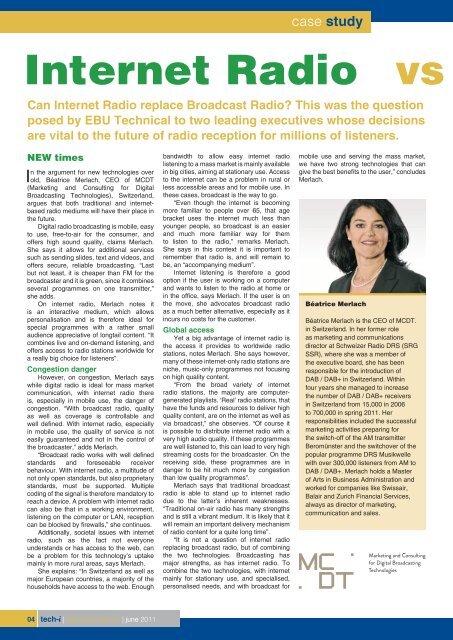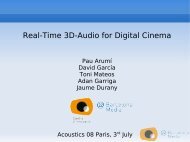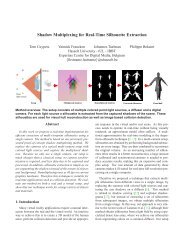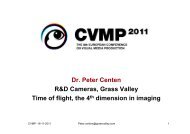EBU tech-i edition 8 - EBU Technical
EBU tech-i edition 8 - EBU Technical
EBU tech-i edition 8 - EBU Technical
Create successful ePaper yourself
Turn your PDF publications into a flip-book with our unique Google optimized e-Paper software.
case study<br />
Internet Radio vs<br />
Can Internet Radio replace Broadcast Radio? This was the question<br />
posed by <strong>EBU</strong> <strong>Technical</strong> to two leading executives whose decisions<br />
are vital to the future of radio reception for millions of listeners.<br />
NEW times<br />
In the argument for new <strong>tech</strong>nologies over<br />
old, Béatrice Merlach, CEO of MCDT<br />
(Marketing and Consulting for Digital<br />
Broadcasting Technologies), Switzerland,<br />
argues that both traditional and internetbased<br />
radio mediums will have their place in<br />
the future.<br />
Digital radio broadcasting is mobile, easy<br />
to use, free-to-air for the consumer, and<br />
offers high sound quality, claims Merlach.<br />
She says it allows for additional services<br />
such as sending slides, text and videos, and<br />
offers secure, reliable broadcasting. “Last<br />
but not least, it is cheaper than FM for the<br />
broadcaster and it is green, since it combines<br />
several programmes on one transmitter,”<br />
she adds.<br />
On internet radio, Merlach notes it<br />
is an interactive medium, which allows<br />
personalisation and is therefore ideal for<br />
special programmes with a rather small<br />
audience appreciative of longtail content. “It<br />
combines live and on-demand listening, and<br />
offers access to radio stations worldwide for<br />
a really big choice for listeners”.<br />
Congestion danger<br />
However, on congestion, Merlach says<br />
while digital radio is ideal for mass market<br />
communication, with internet radio there<br />
is, especially in mobile use, the danger of<br />
congestion. “With broadcast radio, quality<br />
as well as coverage is controllable and<br />
well defined. With internet radio, especially<br />
in mobile use, the quality of service is not<br />
easily guaranteed and not in the control of<br />
the broadcaster,” adds Merlach.<br />
“Broadcast radio works with well defined<br />
standards and foreseeable receiver<br />
behaviour. With internet radio, a multitude of<br />
not only open standards, but also proprietary<br />
standards, must be supported. Multiple<br />
coding of the signal is therefore mandatory to<br />
reach a device. A problem with internet radio<br />
can also be that in a working environment,<br />
listening on the computer or LAN, reception<br />
can be blocked by firewalls,” she continues.<br />
Additionally, societal issues with internet<br />
radio, such as the fact not everyone<br />
understands or has access to the web, can<br />
be a problem for this <strong>tech</strong>nology’s uptake<br />
mainly in more rural areas, says Merlach.<br />
She explains: “In Switzerland as well as<br />
major European countries, a majority of the<br />
households have access to the web. Enough<br />
bandwidth to allow easy internet radio<br />
listening to a mass market is mainly available<br />
in big cities, aiming at stationary use. Access<br />
to the internet can be a problem in rural or<br />
less accessible areas and for mobile use. In<br />
these cases, broadcast is the way to go.<br />
“Even though the internet is becoming<br />
more familiar to people over 65, that age<br />
bracket uses the internet much less than<br />
younger people, so broadcast is an easier<br />
and much more familiar way for them<br />
to listen to the radio,” remarks Merlach.<br />
She says in this context it is important to<br />
remember that radio is, and will remain to<br />
be, an “accompanying medium”.<br />
Internet listening is therefore a good<br />
option if the user is working on a computer<br />
and wants to listen to the radio at home or<br />
in the office, says Merlach. If the user is on<br />
the move, she advocates broadcast radio<br />
as a much better alternative, especially as it<br />
incurs no costs for the customer.<br />
Global access<br />
Yet a big advantage of internet radio is<br />
the access it provides to worldwide radio<br />
stations, notes Merlach. She says however,<br />
many of these internet-only radio stations are<br />
niche, music-only programmes not focusing<br />
on high quality content.<br />
“From the broad variety of internet<br />
radio stations, the majority are computergenerated<br />
playlists. ‘Real’ radio stations, that<br />
have the funds and resources to deliver high<br />
quality content, are on the internet as well as<br />
via broadcast,” she observes. “Of course it<br />
is possible to distribute internet radio with a<br />
very high audio quality. If these programmes<br />
are well listened to, this can lead to very high<br />
streaming costs for the broadcaster. On the<br />
receiving side, these programmes are in<br />
danger to be hit much more by congestion<br />
than low quality programmes”.<br />
Merlach says that traditional broadcast<br />
radio is able to stand up to internet radio<br />
due to the latter’s inherent weaknesses.<br />
“Traditional on-air radio has many strengths<br />
and is still a vibrant medium. It is likely that it<br />
will remain an important delivery mechanism<br />
of radio content for a quite long time”.<br />
“It is not a question of internet radio<br />
replacing broadcast radio, but of combining<br />
the two <strong>tech</strong>nologies. Broadcasting has<br />
major strengths, as has internet radio. To<br />
combine the two <strong>tech</strong>nologies, with internet<br />
mainly for stationary use, and specialised,<br />
personalised needs, and with broadcast for<br />
mobile use and serving the mass market,<br />
we have two strong <strong>tech</strong>nologies that can<br />
give the best benefits to the user,” concludes<br />
Merlach.<br />
Béatrice Merlach<br />
Béatrice Merlach is the CEO of MCDT.<br />
in Switzerland. In her former role<br />
as marketing and communications<br />
director at Schweizer Radio DRS (SRG<br />
SSR), where she was a member of<br />
the executive board, she has been<br />
responsible for the introduction of<br />
DAB / DAB+ in Switzerland. Within<br />
four years she managed to increase<br />
the number of DAB / DAB+ receivers<br />
in Switzerland from 15,000 in 2006<br />
to 700,000 in spring 2011. Her<br />
responsibilities included the successful<br />
marketing activities preparing for<br />
the switch-off of the AM transmitter<br />
Beromünster and the switchover of the<br />
popular programme DRS Musikwelle<br />
with over 300,000 listeners from AM to<br />
DAB / DAB+. Merlach holds a Master<br />
of Arts in Business Administration and<br />
worked for companies like Swissair,<br />
Balair and Zurich Financial Services,<br />
always as director of marketing,<br />
communication and sales.<br />
04 <strong>tech</strong>-i | http://<strong>tech</strong>.ebu.ch | june 2011





